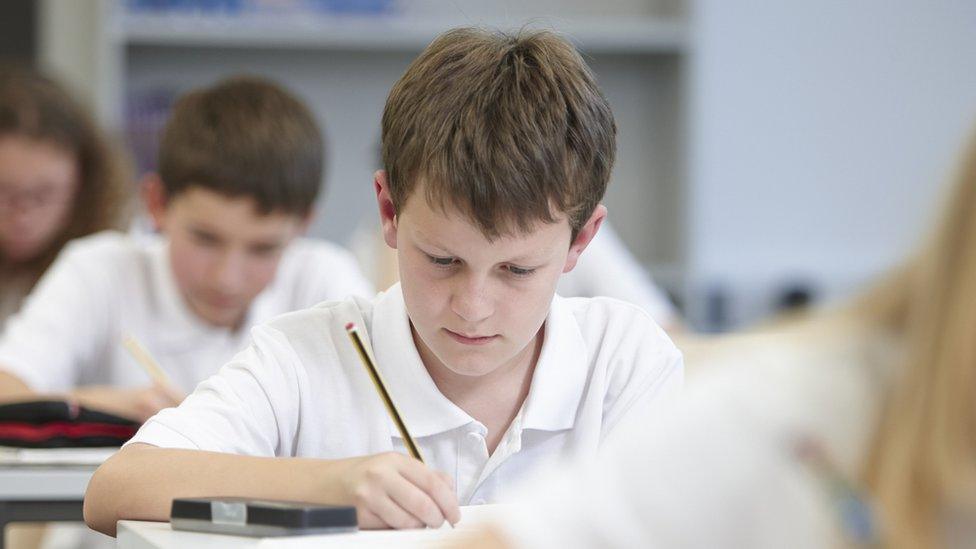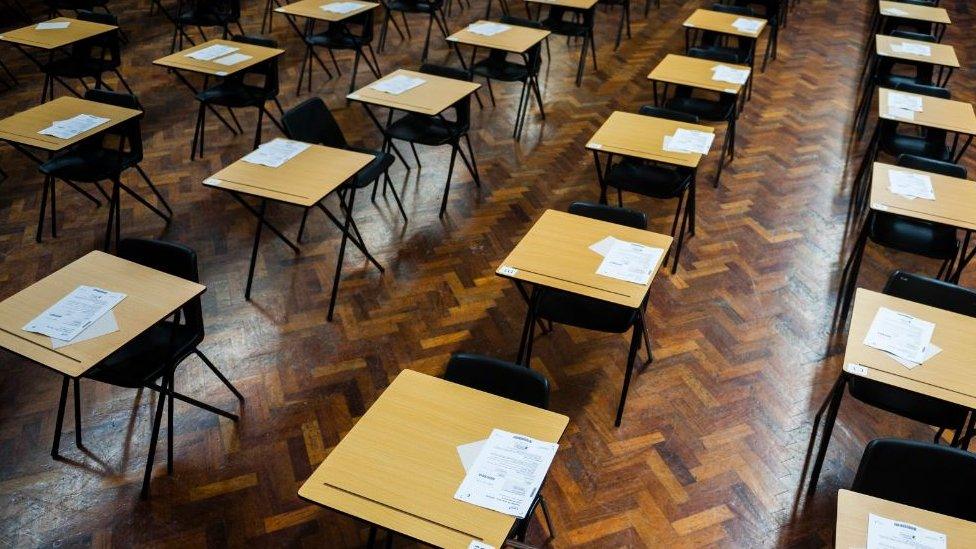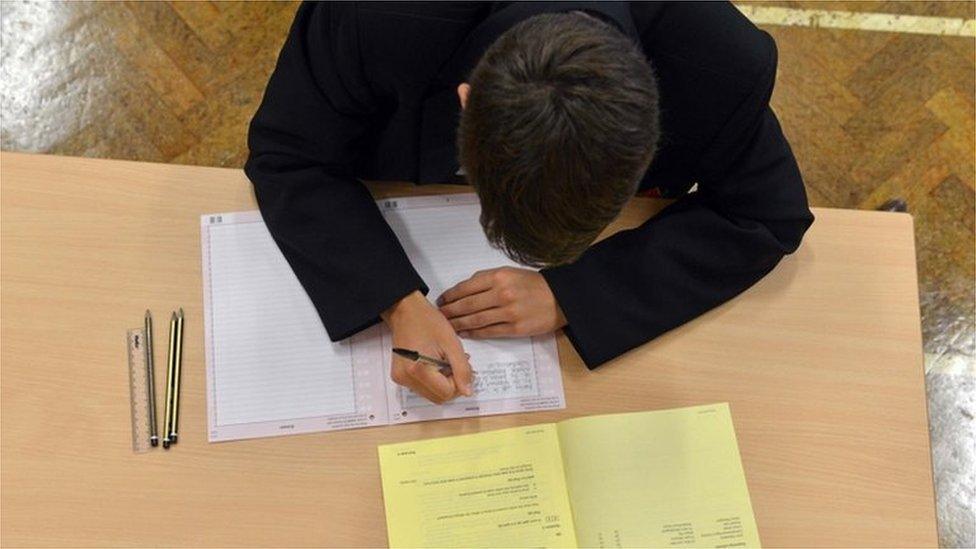Grammar schools set to run single transfer test from November 2023
- Published

Grammar schools in Northern Ireland are set to run a single common transfer test from November 2023.
A confidential document obtained by BBC News NI outlines plans for a common test with two papers to be held that month.
If agreed, the plans would bring to an end the current system of separate tests run by AQE and PPTC.
The BBC understands the majority of grammars have already agreed to the plans, but a minority remain opposed.
A new company - the Schools' Entrance Assessment Group (SEAG) - is being set up to run the transfer test.
The proposals have been drawn up by a group of 15 current and former grammar principals, referred to as "the implementation and the negotiating teams."
Grammar-school boards of governors have been asked to decide whether to sign up to the plan by 15:00 on 29 September.
None of the group of principals behind the common test proposals agreed to be interviewed by BBC News NI.
However, one source claimed that "the reality of a single test is closer than ever."
The confidential document, called "Towards a Single Assessment" was circulated to schools who normally use transfer tests in early September.
"Members of the negotiating team and implementation team, made up of principals and members of PPTC and principals of AQE schools, have been working over the last few years to agree a framework to see the introduction of one system of assessment," the document begins.
"We believe, with the actions outlined in this paper, the first testing using a single assessment model can be in November 2023."
It goes on to say that the SEAG will be formed in October 2021, so schools have to agree to be members of it by 29 September.
The paper then goes on to give more details about the SEAG, the format and cost of the new tests.

Analysis: Education's most contentious issue
At the moment, the transfer tests are probably the most contentious thing in Northern Ireland's education system.
There are a wide spectrum of views on academic selection.
This document takes the view that academic selection will happen, transfer tests will happen, but that the current system of children potentially sitting five potential tests from two providers, between AQE and PPTC, one mainly for Catholic grammars, and one for other controlled and voluntary grammars - that needs to change.
I spoke to one source this morning, he said: "Look, the reality of a single test is closer than ever, and quite frankly, for most grammars, this is the only show in town."
So people have to either get on board, or they have to run their own tests, and he didn't think that would be palatable for most grammar schools.

Chris Donnelly, the principal of St John The Baptist Primary School in Finaghy, said it was "a start", but "not something to get overly excited about".
"In one sense it's a classic case of not being able to see the woods for the trees," he said.
"It's the existence of academic selection, which facilitates the tests, which are exacerbating the divides in our society, and leading to far too many kids leaving school with no or minimal qualifications."
Liam McGuckin, principal of Green Island Primary School in County Antrim, said he was "pleased" with the news.
"There are two different test structures - some schools use both sets of testing - it's very hard for parents to understand," he said.
Mr McGuckin added the new test system would not impact on "what we teach or how we teach it" as it was also based on the curriculum.
'Tests should be scrapped'
However, Sinn Féin assembly member Pat Sheehan said transfer tests should be "scrapped not combined".
"Rather than combining these cruel tests, schools should be showing leadership by scrapping academic selection in favour of an inclusive, non-selective education system which puts children first," he said.
The Alliance Party's education spokesman Chris Lyttle said the transfer process was an "unfair and unnecessary system" for children.
The SDLP's education spokesman Daniel McCrossan welcomed the move to a single test but said it was "deeply regrettable that transfer tests remain in use long after they have proved themselves archaic and unfit for purpose".
"The idea that we can rank our children in a way that has a significant impact on their lives at the age of 11 is appalling," he added.
The SEAG will be run by nine grammar school principals, all of whom will be nominated by grammars signed up to the new tests.
They will manage the administration of the new test and the finances of the organisation.
The document said that "a test provider has been identified" to provide a common test.
However, the company providing the test is not named.

One source claimed that "the reality of a single test is closer than ever"
"The format of the test has been agreed between the test provider and the implementation group within the parameters set out at the commencement of the process," the document said.
Further details about the common transfer test are then given.
"The assessment will consist of two tests," the document said.
"Each test will comprise English and mathematics items.
"The tests will be on separate dates - probably two weeks apart.
"There will be a mixture of multiple choice and free response (supply) items."
Irish-language versions of the transfer test will also be provided.
"Financing the new company will come from two sources," the document continued.
"An administration payment by parents of £20 per pupil - except for pupils who can claim a Free School Meal entitlement for whom the cost will be £0."
The document also says there would be "a contribution made by each member school."
In 2019/2020 - the most recent school year that transfer tests took place - there were 16,257 entrants in total for the separate AQE and Post-Primary Transfer Consortium (PPTC) tests.
The tests were cancelled in 2020/21 due to disruption caused by the coronavirus pandemic.
It cost £60 for parents to enter their children for the AQE test in 2021/22 - unless they were entitled to free school meals in which case they did not have to pay a fee.
There is no fee for children to enter the current PPTC test.
Related topics
- Published22 January 2021

- Published3 March 2021
